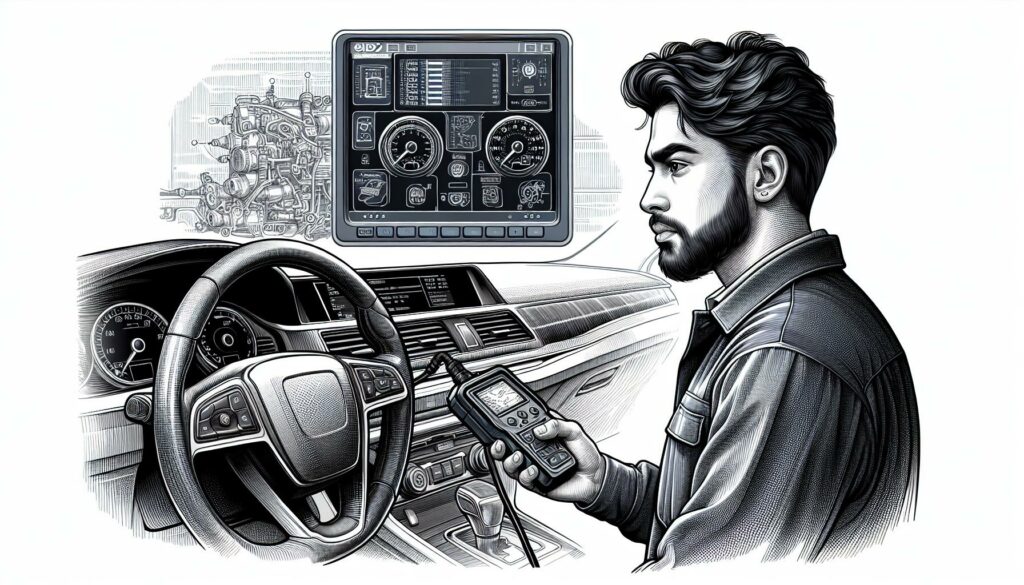If you’re like me, you know that an OBD2 scanner is a must-have tool for any car owner. It’s the quickest way to diagnose car problems without needing a trip to the mechanic. But with so many options out there, how do you pick the right one?
First, you need to consider compatibility. Not all scanners work with every car make or model. It’s also crucial to think about the features you need. Some scanners just read error codes, while others can monitor real-time data.
Lastly, don’t forget about ease of use. You don’t want to spend hours trying to figure out how to use your new tool. In the next sections, I’ll delve deeper into these points to help you make an informed decision. Let’s get started, shall we?
Compatibility
Diving deeper into the selection criteria for an OBD2 scanner, let’s put an emphasis on Compatibility. This factor holds immense importance and it’s impossible to overstate how critical it is to get right.
Firstly, compatibility comes into play regarding your vehicle. Different cars communicate with their electronic systems in different ways. It’s crucial to verify that the scanner you’re eyeing supports your car’s make, model, and year. Now, you might be wondering, how can I do that?
Most manufacturers will provide a list of compatible vehicles. You should be able to find this information on the product pages, in user manuals, or directly from the manufacturers’ customer support. Let’s not gamble – the last thing you want is a scan tool that simply won’t connect to your car.
Some OBD2 scanners market themselves as being “universal”. This essentially means that they support all vehicles that are compliant with OBD2 standards. But even then, it’s advised to check the scanner’s compatibility list. Some car manufacturers use proprietary codes that “universal” scanners may not be able to read.
The second aspect of compatibility relates to the kind of data the scanner can read. Basic models will read only engine trouble codes. More advanced units may support additional features like airbag systems, brake systems, automatic transmissions, and more. Depending on your desire to dig into your vehicle’s performance, you might choose the latter.
Let’s also not forget about software compatibility. If you’re planning to use the device with a computer or a smartphone app, you need to ensure that it’s compatible with your operating system.
A crucial tip: it never hurts to read some user reviews. They can give you the lowdown on how well the device actually works with different car models as well as other potential quirks.
Compatibility is the absolute cornerstone of choosing an OBD2 scanner. Your ideal scanner must tick these compatibility boxes: your vehicle make and model, the data you want to read, and the software you plan to use. It’s an unforgiving criterion — but getting this part right is sure to save you a whole world of headaches down the road.
Features to Consider
After understanding compatibility, there’s more to consider when you’re on the hunt for a perfect OBD2 scanner. The feature set of an OBD2 scanner varies significantly across different models. Here’s what you need to look out for.
- Data Reading Capability: OBD2 scanners can differ in the extent to which they can provide vehicle diagnostics. Some only read engine trouble codes while others convey comprehensive data regarding transmission, brakes, and other vehicle systems. For in-depth diagnostics, it’s worth opting for a scanner that includes data on Vehicle Emission Control Information (VECI).
Check for Live Data Streaming. This allows real-time tracking of how different systems in your car perform. When the car runs, these OBD2 scanners capture and display data instantly providing a wealth of information which can be critical in unearthing potential issues.
- Usability: Look for a user-friendly interface that you can navigate without needing a manual. Some OBD2 scanners equip a backlit screen, allowing easier diagnostic readings in different light conditions. Others offer multilingual menus which can be advantageous if English isn’t your first language.
- Software Updates: Technology evolves rapidly and so does the automotive industry. An OBD2 scanner with updatable software is desirable. This ensures that your scanner keeps up with the arrival of new car models and changes in diagnostic error codes.
- Additional Features: Some high-end OBD2 scanners include unique features like printing capability for maintaining hard copies of diagnostic data, or Bluetooth connectivity for wireless convenience. Remember, these extras might add to the cost.
Here’s a succinct table reiterating the features:
| Feature | Benefit |
|---|---|
| Data Reading Capability | Comprehensive Coverage |
| Live Data Streaming | Real-time Diagnostics |
| Usability | Easy Navigation |
| Software Updates | Up-to-date scanning |
| Additional Features | Added Convenience |
Before you make that purchase, keep these factors in your mind. That’ll help you select a scanner that’s right for both your car and your needs. Ultimately, a little research on these features can result in a more favorable and satisfactory OBD2 scanner choice.
Ease of Use
Think about the user interface (UI) when purchasing an OBD2 scanner. You’re going to want one that’s easy to understand and navigate, and let me tell you why.
Consider an OBD2 scanner packed with multifunctional features but has a complex UI. Even if it offers advanced diagnostic functions, wouldn’t it be frustrating if you can’t figure out how to use it? An easy-to-navigate UI ensures you can make the most out of the scanner’s features without breaking a sweat.
Most modern scanners come equipped with intuitive, user-friendly interfaces. Look for ones with clearly labeled buttons, a responsive touch screen, or an easy-to-read display. A scanner with well-designed software will make reading diagnostic trouble codes (DTCs) straightforward and hassle-free.
Part of ease of use also means having the scanner ready-to-go right out of the box. A quick setup and an easy-to-follow guide can eliminate any possible confusion. So, make sure to consider scanners with plug-and-play functionality; it’ll save you a lot of time and won’t require any complicated setups.
Now let’s talk about size and portability. If you’re like me who values mobility, a handheld, compact scanner might be right up your alley. Smaller devices can be stored easily, transported without a hassle, and used in tight spaces, making them excellent tools for both amateur mechanics and professional technicians.
Lastly, don’t forget about customer support. An OBD2 scanner with excellent customer service can help you with troubleshooting issues, software updates, and provide answers to any questions you might have. Trust me, good support can go a long way to make your diagnostic process smooth and less stressful.
The Ease of Use should be a top priority when shopping for an OBD2 scanner. From the user interface to customer service, each aspect plays a vital role in helping you get the job done correctly and efficiently. Keeping these points in mind will surely lead you to a scanner that won’t leave you in a head-scratching situation.
Making an Informed Decision
While it’s important to consider the aforementioned attributes like ease of use, portability, and high-quality customer support, let’s not underestimate the significance of making an informed decision. The crux here is to holistically understand your requirements from an OBD2 scanner before you get one.
Those who want a scanner specifically for personal use might go for something a little less sophisticated than a professional mechanic who needs to diagnose a range of vehicle models. For instance, prospective buyers should ask: do I need a tool that simply reads trouble codes, or something that provides live data feeds as well? An OBD2 scanner with the latter performance will be a bit pricier but can provide beneficial if you demand real-time data.
Moving forward, compatibility is another key consideration. Not all OBD2 scanners are universally compatible with all vehicles. Even though most vehicles manufactured after 1996 are designed to be OBD2 compatible, some scanners may still not function properly with certain models or makes. Always make sure the OBD2 scanner you plan on buying is compatible with the specific vehicles you’ll be using it on.
Additionally, don’t forget about considering future updates and the ability for the device to grow with your needs. Some OBD2 scanners offer periodic software updates that can expand their diagnostic capabilities over time. This is an added advantage, especially if you envision using the same device in the coming years.
Lastly, the functionality and specific features of the tool are not to be overshadowed. A wide range of features aren’t necessarily better unless they serve your needs. Features like VIN (Vehicle Identification Number) recognition, emission readiness status checks, and data printouts are helpful, but probably not essentials for some users.
- Is the scanner capable of reading and clearing saved error codes?
- Does it provide real-time data feeds?
- How about features like freeze frame data or built-in readiness tests?
Conclusion
So there you have it. We’ve navigated the complex world of OBD2 scanners together. Remember, it’s not just about the price tag or the brand name. It’s about finding a tool that’s easy to use, portable, and backed by solid customer support. It’s about understanding your unique needs and making sure the scanner you choose is up to the task. Whether you’re a professional mechanic or a car enthusiast, the right OBD2 scanner can make all the difference in your vehicle diagnostics. It’s all about making an informed decision based on your individual requirements. So take your time, consider the factors we’ve discussed, and you’ll be well on your way to finding the perfect OBD2 scanner for your needs.
Frequently Asked Questions
Question 1: Why is ease of use important when purchasing an OBD2 scanner?
Ease of use is crucial when buying an OBD2 scanner because it ensures you can operate the device properly without extensive training. A scanner that is difficult to use may lead to inaccurate readings or be too complicated for non-technical users to navigate, defeating its purpose.
Question 2: How does portability affect the choice of an OBD2 scanner?
Portability is a significant factor as it provides convenience, especially for professionals who need to carry the scanner to different locations or use it in tight spaces. A compact and lightweight OBD2 scanner makes transportation easier.
Question 3: What role does customer support play?
Good customer support aids in troubleshooting potential issues, software updates, and understanding how to use the scanner effectively. It’s particularly important for beginners or less technically inclined users who may require assistance in navigating the device.
Question 4: Why should I consider the scanner’s data reading capabilities and vehicle compatibility?
The scanner’s data reading capabilities and vehicle compatibility ensure the device can accurately diagnose the issues related to your specific vehicle’s make and model. Without these, the scanner might not provide the correct information or function at all with your vehicle.
Question 5: What is the relevance of future updates when selecting a scanner?
Future updates ensure that your scanner stays relevant and can diagnose new error codes or work with newer vehicle models. Without periodic updates, the longevity and usefulness of the scanner may be compromised.

